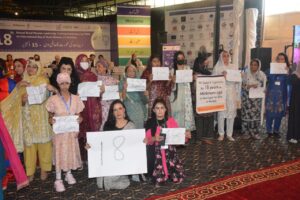Islamabad-UNS: On the concluding day of the 3-day 18th Annual Rural Women Leadership Training Conference organized by PODA, Dr. Sebastien Lorion, Team Leader for Governance and Human Capital Development at the Delegation of the European Union to Pakistan, said that raising the minimum age of marriage for girls to 18 years is one of the EU’s key commitments. He reaffirmed the EU’s support for ongoing efforts to protect the fundamental rights of girls and noted that Pakistan has signed international treaties that call for such legislation. He also said that the upcoming GSP+ review mission includes the enforcement of 18 years as the minimum age of marriage for girls as one of its agenda points.

Sameena Nazir, Executive Director of PODA, recommended documenting the often invisible work and contributions of women more effectively to improve the accuracy of gender equality data in the World Economic Forum report, which currently ranks Pakistan near the bottom of the list of countries. PODA organized the conference in collaboration with Lok Virsa with support from the European Union in Pakistan and the Embassy of Norway in Pakistan.
Qaiser Ahmed Sheikh, Federal Minister for Investment and Chairman of the Federal Board of Investment, supported the demand to raise the minimum age of marriage for girls across the country—a call made by more than 800 women leaders. He emphasized that Pakistan’s development depends on the empowerment of women and noted that the full potential of rural women—who form the backbone of the country’s agriculture sector – is not being utilized. Highlighting the growing role of women in public life globally, including in Saudi Arabia, he stressed that it is time for Pakistan to take concrete steps toward women’s empowerment, expressing hope that this vision will soon become a reality. He also appreciated PODA for organizing the conference at such a significant level, allowing women to present their priorities and agenda in the national policy discourse. He also purchased a valuable painting, created by a woman leader, which will be donated to support women affected by the floods.
Dr. Huma Haq, Member of PODA’s Board of Directors and a renowned educationist, thanked the women delegates for their participation, acknowledging the vibrant colors and rich diversity they brought to the conference—core elements that reflect the strength and spirit of the gathering. She emphasized the urgent need to end all forms of violence, particularly domestic violence, where women are often abused by male family members. She also stressed the importance of reporting such cases to ensure effective solutions and the proper implementation of existing laws.
Diplomats from Spain and Kenya also participated in the conference and praised it as a meaningful and vibrant gathering that showcased strong womanhood and solidarity in support of women’s causes.
The session on “Artificial Intelligence Use, Training, and Future Jobs in Pakistan” highlighted the transformative potential of AI across diverse sectors. Daniela Draugelis, Founder and CEO of Cultural Pathways, emphasized how rural women can shape the future with AI, advocating for inclusive digital literacy and AI-driven opportunities to empower women in underserved communities. Gulmina Bilal, Chairperson of NAVTTC, discussed the critical role of AI in future jobs and entrepreneurship, underscoring the need for targeted training programs that align with emerging market demands and equip youth with the skills to thrive in a rapidly evolving digital economy. “You will not find your own cultural representation in AI because it does not yet exist within its data. It is therefore essential to make AI learn from your experiences, reflect your realities, cultural diversity and understand your needs so that it can respond to you in meaningful and culturally relevant ways,” said Gulmina Bilal.
“The more we work with data, the better the system becomes. However, the data we receive can sometimes be misleading or biased. Using the available data while maintaining a critical approach—rather than relying on it completely – is a more credible and effective way to engage with current information,” said Daniela Draugelis.
In connection with the International Day for the Eradication of Poverty, observed annually on 17 October, Zia ur Rehman, Chief Executive of Awaz, emphasized that ending poverty is not just about income – it is fundamentally about ensuring social protection, promoting social justice, and recognizing the significant contributions of women to their communities.
Huma Irshad – a wheelchair user representing persons with disabilities – called for the elimination of derogatory stereotypes such as ‘langra’ and ‘lola’, urging society to recognize people with disabilities as equal human beings deserving of dignity and respect.”
Umme Sial from Muzaffargarh presented the resolutions, which were unanimously passed by the women’s platform. Women leaders from around 100 districts across Pakistan came together to address key issues such as early and forced marriages, limited access to education and economic opportunities, barriers to digital inclusion, and the lack of recognition of women’s role in agriculture. The participants adopted Resolution 2025, urging the government to ensure inclusive and gender-responsive flood relief, climate governance, political participation, recognition of women farmers, improved mobility and hostel facilities, involvement in agricultural policy, livestock recovery loans, disaster preparedness training, environmental protection, enforcement of anti-harassment measures, legal reforms on the minimum marriage age, establishment of Women Protection Committees in KP, anti-harassment committees in private and government schools, a gender-sensitive policy for internally displaced persons, and expanded access to AI and cybersecurity education. The resolution calls for urgent action to empower rural women as equal partners in building a resilient and inclusive Pakistan.



